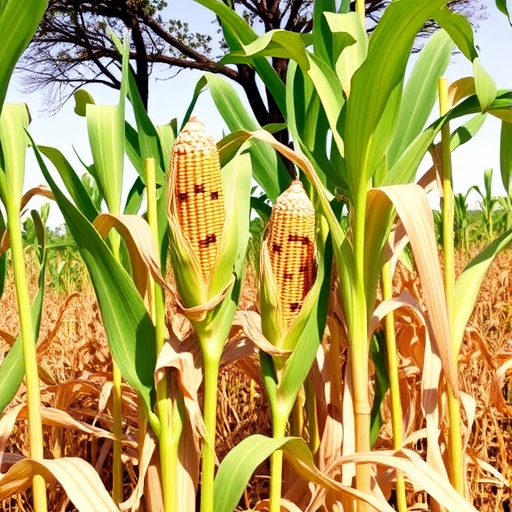In a groundbreaking study conducted in the Guinea Savanna agroecological zone, researchers led by Abdul-Aziz et al. have unveiled significant findings regarding the optimization of maize varietal response to nitrogen fertilization. This critical investigation addresses one of the key challenges in modern agriculture: improving crop yield through precise nutrient management. As maize stands as a staple food source in many regions, enhancing its growth and productivity through better fertilization techniques is of paramount importance.
The study meticulously evaluated various maize varieties to ascertain their distinct response mechanisms to nitrogen fertilization. Given that nitrogen is an essential macronutrient for plant growth, the researchers aimed to understand how different genetic backgrounds influence the efficiency of nitrogen utilization. This exploration not only has significant implications for agronomy but also for food security and sustainability in areas heavily reliant on maize as a food source.
Through extensive field trials and experiments, the team gathered data on growth parameters such as plant height, leaf area index, and yield. The results revealed substantial variations in how different maize cultivars responded to nitrogen application. Some varieties demonstrated a remarkable ability to capitalize on nitrogen inputs, leading to higher yields, while others showed limited responses regardless of fertilizer levels. This disparity underscores the importance of selecting appropriate maize varieties tailored to specific nutritional conditions.
The implications of this research are especially pertinent in the context of increasing global food demand. With population growth and changing climatic conditions, the pressure on agricultural systems will only intensify. By optimizing nitrogen fertilization strategies, farmers can enhance productivity without exacerbating soil deterioration or environmental concerns linked to over-fertilization. Thus, the findings from the Guinea Savanna agroecological zone are not merely academic; they set the groundwork for practical applications that could revolutionize farming practices.
In the quest for sustainability, the researchers also explored the interactions between nitrogen fertilization and other agronomic practices. Crop rotation, intercropping, and integrated pest management were assessed alongside nitrogen application to determine their collective impact on maize productivity. This holistic approach not only offers a roadmap for farmers seeking to maximize their yields but also encourages eco-friendly practices that benefit the ecosystem.
Moreover, the study examined the economic aspects of nitrogen fertilization. By analyzing cost-benefit ratios linked to the use of various maize varieties and their responsiveness to nitrogen, the researchers aimed to guide farmers in making informed decisions. Understanding the economic implications of fertilization strategies is crucial for smallholder farmers who must manage limited resources while striving for profitability and sustainability.
In detailing the methodologies employed, the study highlights the rigorous statistical analyses and experimental designs used to ensure reliable results. The researchers utilized randomized complete block designs to eliminate bias and ensure that findings could be generalized across different planting conditions. Additionally, they employed advanced agronomic techniques, such as remote sensing, to measure plant health and nutrient uptake efficiently.
Through a systematic approach, the team has contributed to the foundation of precision agriculture. By illustrating the variability in maize variety responses, they provide a pathway for future research aimed at fine-tuning fertilization practices tailored to individual crops. Such advancements could pave the way for the integration of technology in agriculture, including the use of drones and artificial intelligence to monitor and optimize plant growth in real-time.
Further emphasizing the significance of their research, Abdul-Aziz and colleagues advocate for policy changes that support the adoption of science-backed agricultural practices. They highlight the necessity for governments and agricultural agencies to promote education on nutrient management strategies and the importance of supporting farmers in implementing these research findings. As global food systems face unprecedented challenges, collaboration among stakeholders is essential to drive innovation and ensure food security.
The study’s findings resonate with the ongoing discourse about sustainable agriculture and its role in combating climate change. Efficient nitrogen use not only improves crop yields but also minimizes the release of greenhouse gases associated with excessive fertilization. This dual benefit could make a substantial difference in mitigating climate impacts while simultaneously addressing food production needs.
In conclusion, the work of Abdul-Aziz et al. serves as a vital reference point for researchers, practitioners, and policymakers aiming to enhance maize productivity through optimized nitrogen management. As they continue to unravel the complexities of plant-nutrient interactions, their research promises to contribute significantly to the literature on sustainable agriculture while addressing urgent global challenges. The study does not merely highlight an agricultural issue but propels discussions about the future of food security, environmental sustainability, and economic resilience in farming communities.
The insights gained from this research signify a leap forward in our understanding of crop nutrition, particularly in resource-limited settings. As the agricultural landscape continues to evolve, the call for evidence-based practices such as those demonstrated in this study will likely gain traction among a growing number of thinkers, farmers, and scientists seeking solutions that are both practical and scalable.
In an era marked by technological advancements and increasing awareness of ecological impacts, the work surrounding maize varietal response to nitrogen fertilization in the Guinea Savanna is among many that affirm science’s pivotal role in shaping resilient agricultural systems. Ultimately, this study epitomizes the profound connection between scientific inquiry and its practical applications in the quest for a sustainable future.
Subject of Research: Optimization of maize varietal response to nitrogen fertilization.
Article Title: Optimizing maize varietal response to nitrogen fertilization in the Guinea Savanna agroecological zone.
Article References:
Abdul-Aziz, AL., Haruna, A., Galadima, M.M. et al. Optimizing maize varietal response to nitrogen fertilization in the Guinea Savanna agroecological zone.
Discov. Plants 2, 294 (2025). https://doi.org/10.1007/s44372-025-00370-6
Image Credits: AI Generated
DOI:
Keywords: Nitrogen fertilization, maize varieties, guinea savanna agroeconomic zone, sustainable agriculture, crop yield optimization.




